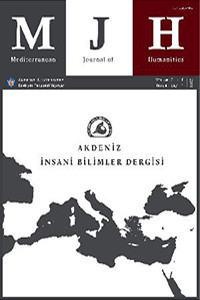Öz
Joseph Conrad wrote Nostromo (1904) at the crucial moment that witnessed the clash between the retreating nineteenth and the ensuing 19th century. The period encompassed the point of no return towards the logical perfection of the Golden Age and ushered the world towards the meaningless chaos of modernity. The paper argues that being conscious of the approaching subservience of the traditional treatment of history to the random collection of histories typical of the twentieth century modernity, Joseph Conrad’s Nostromo is expressive of the persistent longing for the meaningful, solid, epic-like occurrences from the past, as opposed to the absurd mutability of contemporary histories. Yet, this yearning is devoid of any traces of hope and is, therefore, indicative of Conrad’s prophesy regarding the impossibility of certainty and meaningful history
Kaynakça
- Borradori G. 2003, Philosophy in a Time of Terror. Dialogues with Jurgen Habermas and Jacques Derrida. Chicago.
- Brinks J. H. 2006, Nationalist Myths and Modern Media: Cultural Identity in the Age of Globalization. London.
- Conrad J. 1983, The Collected Letters of Joseph Conrad. Vol. 1: 1861-1897. London.
- Conrad J. 1987, Nostromo. A Tale of the Seaboard. London.
- Crankshaw E. 1976, Joseph Conrad. Some Aspects of the Art of the Novel. New York.
- Fothergill A. 2005, “Connoisseurs of Terror and the Political Aesthetics of Anarchism. Nostromo and a set of Six”. Ed. P. Mallios, Conrad in the Twenty-First Century. Contemporary Approaches and Perspectives. London, 137-154.
- Hampson R. 2005, “Conrad’s Heterotopic Fiction: Composite Maps, Superimposed Sites, and Impossible Spaces, Conrad in the Twenty-First Century”. Ed. P. Mallios. Conrad in the Twenty-First Century. Contemporary Approaches and Perspectives. London, 143-158.
- Johnson B. 1971, Conrad's Models of Mind. Minneapolis.
- Loidolt M. 2007, Modernism. Wien.
- Novack G. 2011, Major Theories of History from the Greeks to Marxism. Chippendale.
- Panichas G. 2005, Joseph Conrad. His Moral Vision. Macon.
- O’Malley S. 2015, Making History New: Modernism and Historical Narrative. Oxford.
- Reilly J. 1993, Shadowtime. London and New York.
- Rodwan J. 2009, “Joseph Conrad’s Tragic Predicament”. Open Letters Monthly: an Arts and Literature
- Review. Source: https://openlettersmonthlyarchive.com/olm/joseph-conrads-tragic-predicament. Access Date: 15.09.2021
- Ryan K. 1982, “Revelation and Repression in Conrad's Nostromo”. Ed. D. Jefferson, The Uses of Fiction: Essays in Honor of Arnold Kettle 69-82. Open University Press.
Öz
Joseph Conrad, Nostromo (1904) adlı romanını, 19. yüzyılın silikleştiği ve ardından gelen yirminci yüzyılın belirginleştiği dönemdeki çatışmaya tanıklık eden, önemli bir anda yazmıştır. Bu dönem esasen, Altın Çağ'ın mantıksal mükemmelliğine geri dönüşün olanaksız olduğunun görünür olduğu bir noktayı kapsıyordu ve dünya modernitenin anlamsız kaosuna doğru ilerlemeye başlamıştı. Bu makale, tarihe geleneksel yaklaşımının egemenliğinden, yirminci yüzyılın modernitesinin belirsiz gerçekliğine doğru gidişatı işaret eden Joseph Conrad'ın Nostromo adlı romanının önemini, onun, gelecek hikayelerin absürt değişkenliğine karşı, geçmişin anlamlı, katı, destansı türden olaylara ısrarcı özlemini ifade ettiği iddiasıyla tartışmaktadır. Yine de, bu hasret, herhangi bir umut izinden yoksundur. Bu nedenle, Conrad'ın kesinliğin ve anlamlı tarihin imkânsızlığına ilişkin kehanetinin altını çizmektedir
Kaynakça
- Borradori G. 2003, Philosophy in a Time of Terror. Dialogues with Jurgen Habermas and Jacques Derrida. Chicago.
- Brinks J. H. 2006, Nationalist Myths and Modern Media: Cultural Identity in the Age of Globalization. London.
- Conrad J. 1983, The Collected Letters of Joseph Conrad. Vol. 1: 1861-1897. London.
- Conrad J. 1987, Nostromo. A Tale of the Seaboard. London.
- Crankshaw E. 1976, Joseph Conrad. Some Aspects of the Art of the Novel. New York.
- Fothergill A. 2005, “Connoisseurs of Terror and the Political Aesthetics of Anarchism. Nostromo and a set of Six”. Ed. P. Mallios, Conrad in the Twenty-First Century. Contemporary Approaches and Perspectives. London, 137-154.
- Hampson R. 2005, “Conrad’s Heterotopic Fiction: Composite Maps, Superimposed Sites, and Impossible Spaces, Conrad in the Twenty-First Century”. Ed. P. Mallios. Conrad in the Twenty-First Century. Contemporary Approaches and Perspectives. London, 143-158.
- Johnson B. 1971, Conrad's Models of Mind. Minneapolis.
- Loidolt M. 2007, Modernism. Wien.
- Novack G. 2011, Major Theories of History from the Greeks to Marxism. Chippendale.
- Panichas G. 2005, Joseph Conrad. His Moral Vision. Macon.
- O’Malley S. 2015, Making History New: Modernism and Historical Narrative. Oxford.
- Reilly J. 1993, Shadowtime. London and New York.
- Rodwan J. 2009, “Joseph Conrad’s Tragic Predicament”. Open Letters Monthly: an Arts and Literature
- Review. Source: https://openlettersmonthlyarchive.com/olm/joseph-conrads-tragic-predicament. Access Date: 15.09.2021
- Ryan K. 1982, “Revelation and Repression in Conrad's Nostromo”. Ed. D. Jefferson, The Uses of Fiction: Essays in Honor of Arnold Kettle 69-82. Open University Press.
Ayrıntılar
| Birincil Dil | İngilizce |
|---|---|
| Konular | Çeviri ve Yorum Çalışmaları, Dil Çalışmaları (Diğer) |
| Bölüm | Araştırma Makaleleri |
| Yazarlar | |
| Yayımlanma Tarihi | 30 Haziran 2022 |
| Yayımlandığı Sayı | Yıl 2022 Cilt: 12 |
| Adres: Akdeniz İnsani Bilimler Dergisi Akdeniz Üniversitesi, Edebiyat Fakültesi 07058 Kampüs, Antalya / TÜRKİYE | E-Posta: mjh@akdeniz.edu.tr |


